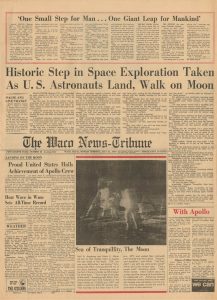On the night of July 20, 1969, an estimated 600 million people tuned in to watch American astronauts Neil Armstrong and Buzz Aldrin land on the surface of the moon. As Armstrong stepped onto the lunar dust, his voice came through to listeners on earth, relaying a poetic message of triumph: “That’s one small step for a man, one giant leap for mankind.” With these words, the space race effectively ended, and the U.S. had put the first person on the moon.

Almost fifty years after the moon landing, it might be difficult to grasp just how momentous this event was. Space travel was a new phenomenon—NASA had now accomplished something that seemed possible only in science fiction twenty years before. It had been less than a decade since the first Russian cosmonaut was launched into space and only seven years after John Glenn orbited the earth. At the same time, newly developed television technology made it possible for NASA to broadcast the moon landing. This broadcast brought the spare beauty of the moon into the homes of millions, making outer space present and seeable.
In our time, we’re probably used to seeing images from space. But can you imagine the excitement and anxiety this strange new perspective brought people in 1969?
A search through the W. R. Poage papers at the Poage Library provides a glimpse into the wide spectrum of responses that came after the U.S. moon landing. Though Poage was known as “Mr. Agriculture,” several constituents sent letters to him to express their opinion on the moon landing. These letters show Poage’s profound interest in space travel during his time in office. Whether the letters Poage received expressed worry or exhilaration over the moon landing, Poage answered with fervent support for NASA’s historic achievement.
One letter to Poage congratulates the U.S. government on becoming the first country to land on the moon. Poage’s response echoes Armstrong’s statements from the moon: “I am proud and happy that the United States could have an important part in this undertaking, but I think that through the years this will be but another step in the advancement of mankind.” Another of Poage’s letters tells a constituent about attending the Apollo 11 launch. He asserts that members of Congress must be informed about important “public actions and expenditures,” and he believes that first-hand knowledge of the launch was vital as a member of Congress.
Taken together, these letters reveal Poage as an advocate of space travel and scientific exploration. He even helped to bring this interest in space travel to Baylor University. When moon samples were touring the U.S. in the early ‘70s, Poage wrote to NASA on behalf of Baylor’s Strecker Museum (later incorporated into the Mayborn Museum) to secure a piece of moon rock. It was displayed in February 1971.
When we think about the moon landing nowadays, it still feels like an amazing achievement, but perhaps the wonder has worn off. NASA is now looking beyond the moon, sending space crafts to Mars and other planets. Perhaps the public interest in space has also waned. But by diving into the Poage archive, one can experience the excitement and wonder the moon landing inspired in a more personal, direct way. One can understand the profound impact this event made in 1969.